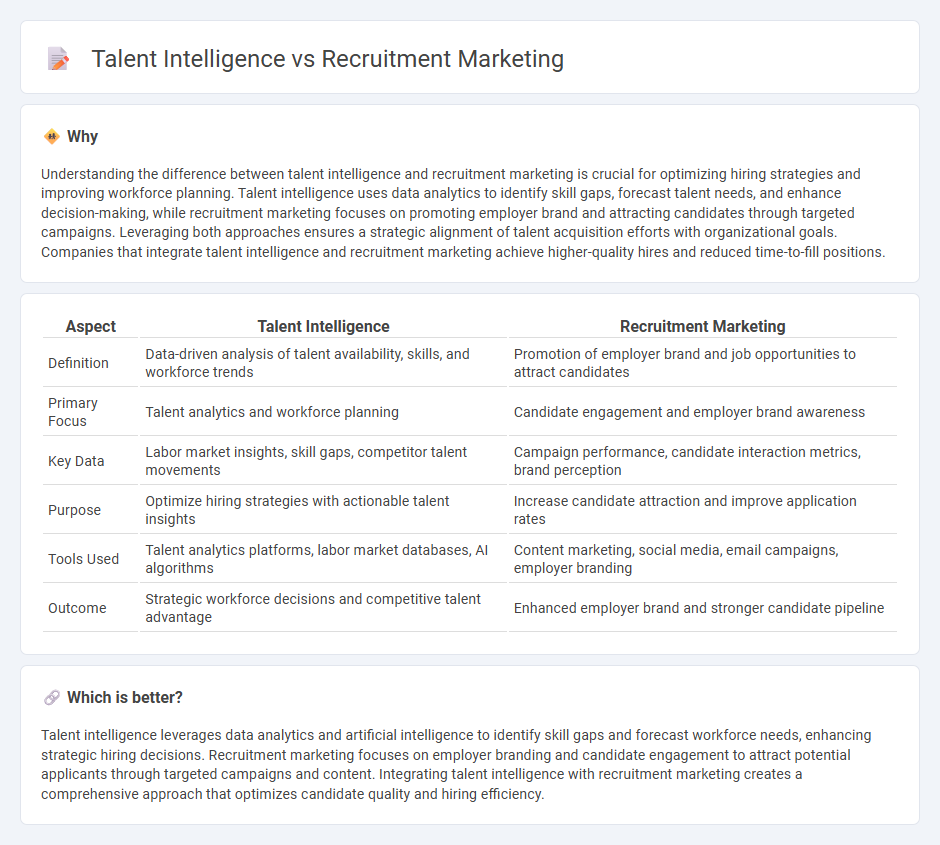
Talent intelligence leverages data analytics and market insights to identify, assess, and attract top candidates more effectively than traditional recruitment marketing methods. Recruitment marketing primarily focuses on employer branding and advertising to generate talent pipelines, while talent intelligence drives strategic decision-making through predictive analytics and competitive benchmarking. Explore how integrating talent intelligence can revolutionize your hiring strategy.
Why it is important
Understanding the difference between talent intelligence and recruitment marketing is crucial for optimizing hiring strategies and improving workforce planning. Talent intelligence uses data analytics to identify skill gaps, forecast talent needs, and enhance decision-making, while recruitment marketing focuses on promoting employer brand and attracting candidates through targeted campaigns. Leveraging both approaches ensures a strategic alignment of talent acquisition efforts with organizational goals. Companies that integrate talent intelligence and recruitment marketing achieve higher-quality hires and reduced time-to-fill positions.
Comparison Table
| Aspect | Talent Intelligence | Recruitment Marketing |
|---|---|---|
| Definition | Data-driven analysis of talent availability, skills, and workforce trends | Promotion of employer brand and job opportunities to attract candidates |
| Primary Focus | Talent analytics and workforce planning | Candidate engagement and employer brand awareness |
| Key Data | Labor market insights, skill gaps, competitor talent movements | Campaign performance, candidate interaction metrics, brand perception |
| Purpose | Optimize hiring strategies with actionable talent insights | Increase candidate attraction and improve application rates |
| Tools Used | Talent analytics platforms, labor market databases, AI algorithms | Content marketing, social media, email campaigns, employer branding |
| Outcome | Strategic workforce decisions and competitive talent advantage | Enhanced employer brand and stronger candidate pipeline |
Which is better?
Talent intelligence leverages data analytics and artificial intelligence to identify skill gaps and forecast workforce needs, enhancing strategic hiring decisions. Recruitment marketing focuses on employer branding and candidate engagement to attract potential applicants through targeted campaigns and content. Integrating talent intelligence with recruitment marketing creates a comprehensive approach that optimizes candidate quality and hiring efficiency.
Connection
Talent intelligence leverages data analytics to identify, attract, and retain high-quality candidates, enhancing recruitment marketing strategies by targeting the right audience with personalized employer branding. Recruitment marketing uses insights from talent intelligence to optimize job ads, improve candidate engagement, and streamline the hiring funnel. Integrating these tools boosts hiring efficiency, reduces time-to-fill, and improves overall workforce quality.
Key Terms
**Recruitment Marketing:**
Recruitment marketing uses targeted campaigns, employer branding, and data analytics to attract and engage qualified candidates, enhancing the talent pipeline. It leverages social media, content marketing, and candidate experience strategies to increase employer visibility and appeal. Explore more about how recruitment marketing optimizes hiring success and candidate engagement.
Employer Branding
Recruitment marketing leverages targeted campaigns and data-driven strategies to enhance employer branding and attract the ideal candidates, while talent intelligence analyzes workforce data to optimize hiring decisions and improve retention. Employer branding benefits from recruitment marketing through compelling storytelling and digital engagement, whereas talent intelligence provides actionable insights on talent trends and competitor positioning. Explore how integrating recruitment marketing with talent intelligence can transform your employer brand and recruitment outcomes.
Candidate Engagement
Recruitment marketing concentrates on creating targeted campaigns and personalized content to attract and engage candidates throughout the hiring process, boosting brand visibility and candidate experience. Talent intelligence leverages data analytics and market insights to understand candidate behavior, preferences, and trends, enabling more strategic and informed engagement tactics. Explore how combining recruitment marketing with talent intelligence can transform your candidate engagement strategies and improve hiring outcomes.
Source and External Links
Recruitment Marketing Guide: Everything to Build Your Strategy - Recruitment marketing involves strategies to attract, engage, and nurture talent before they apply, focusing on both proactive and reactive sourcing, and includes internal and external campaigns to build a strong candidate experience and culture fit for the company.
Recruitment marketing - Wikipedia - Recruitment marketing uses inbound strategies like employer branding, SEO, social media, and candidate relationship management to build a pipeline of qualified candidates for current and future hiring needs, differentiating itself from traditional recruitment by focusing on ongoing talent engagement.
What is Recruitment Marketing: Definition and Benefits | Indeed.com - Recruitment marketing promotes an employer's brand throughout the hiring process to attract and engage qualified candidates by building positive relationships and sharing company culture, using tactics like monitoring reviews, storytelling through blogs and videos, and social media interaction.
 dowidth.com
dowidth.com